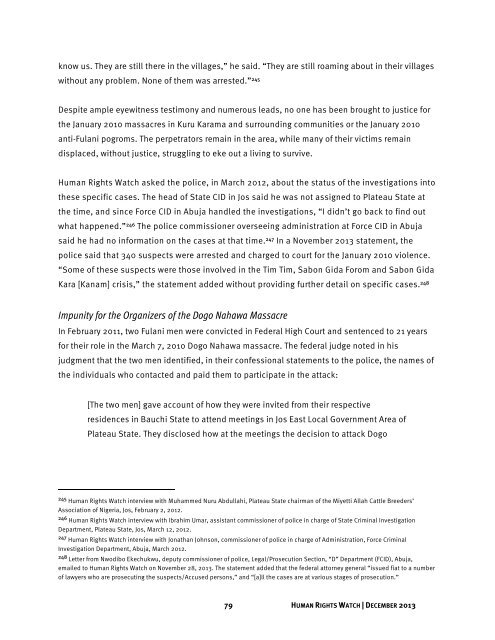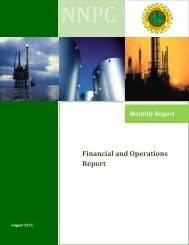Create successful ePaper yourself
Turn your PDF publications into a flip-book with our unique Google optimized e-Paper software.
know us. They are still there in the villages,” he said. “They are still roaming about in their villages<br />
without any problem. None of them was arrested.” 245<br />
Despite ample eyewitness testimony and numerous leads, no one has been brought to justice for<br />
the January 2010 massacres in Kuru Karama and surrounding communities or the January 2010<br />
anti-Fulani pogroms. The perpetrators remain in the area, while many of their victims remain<br />
displaced, without justice, struggling to eke out a living to survive.<br />
Human Rights Watch asked the police, in March 2012, about the status of the investigations into<br />
these specific cases. The head of State CID in Jos said he was not assigned to Plateau State at<br />
the time, and since Force CID in Abuja handled the investigations, “I didn’t go back to find out<br />
what happened.” 246 The police commissioner overseeing administration at Force CID in Abuja<br />
said he had no information on the cases at that time. 247 In a November 2013 statement, the<br />
police said that 340 suspects were arrested and charged to court for the January 2010 violence.<br />
“Some of these suspects were those involved in the Tim Tim, Sabon Gida Forom and Sabon Gida<br />
Kara [Kanam] crisis,” the statement added without providing further detail on specific cases. 248<br />
Impunity for the Organizers of the Dogo Nahawa Massacre<br />
In February 2011, two Fulani men were convicted in Federal High Court and sentenced to 21 years<br />
for their role in the March 7, 2010 Dogo Nahawa massacre. The federal judge noted in his<br />
judgment that the two men identified, in their confessional statements to the police, the names of<br />
the individuals who contacted and paid them to participate in the attack:<br />
[The two men] gave account of how they were invited from their respective<br />
residences in Bauchi State to attend meetings in Jos East Local Government Area of<br />
Plateau State. They disclosed how at the meetings the decision to attack Dogo<br />
245 Human Rights Watch interview with Muhammed Nuru Abdullahi, Plateau State chairman of the Miyetti Allah Cattle Breeders’<br />
Association of Nigeria, Jos, February 2, 2012.<br />
246 Human Rights Watch interview with Ibrahim Umar, assistant commissioner of police in charge of State Criminal Investigation<br />
Department, Plateau State, Jos, March 12, 2012.<br />
247 Human Rights Watch interview with Jonathan Johnson, commissioner of police in charge of Administration, Force Criminal<br />
Investigation Department, Abuja, March 2012.<br />
248 Letter from Nwodibo Ekechukwu, deputy commissioner of police, Legal/Prosecution Section, “D” Department (FCID), Abuja,<br />
emailed to Human Rights Watch on November 28, 2013. The statement added that the federal attorney general “issued fiat to a number<br />
of lawyers who are prosecuting the suspects/Accused persons,” and “[a]ll the cases are at various stages of prosecution.”<br />
79 HUMAN RIGHTS WATCH | DECEMBER 2013




